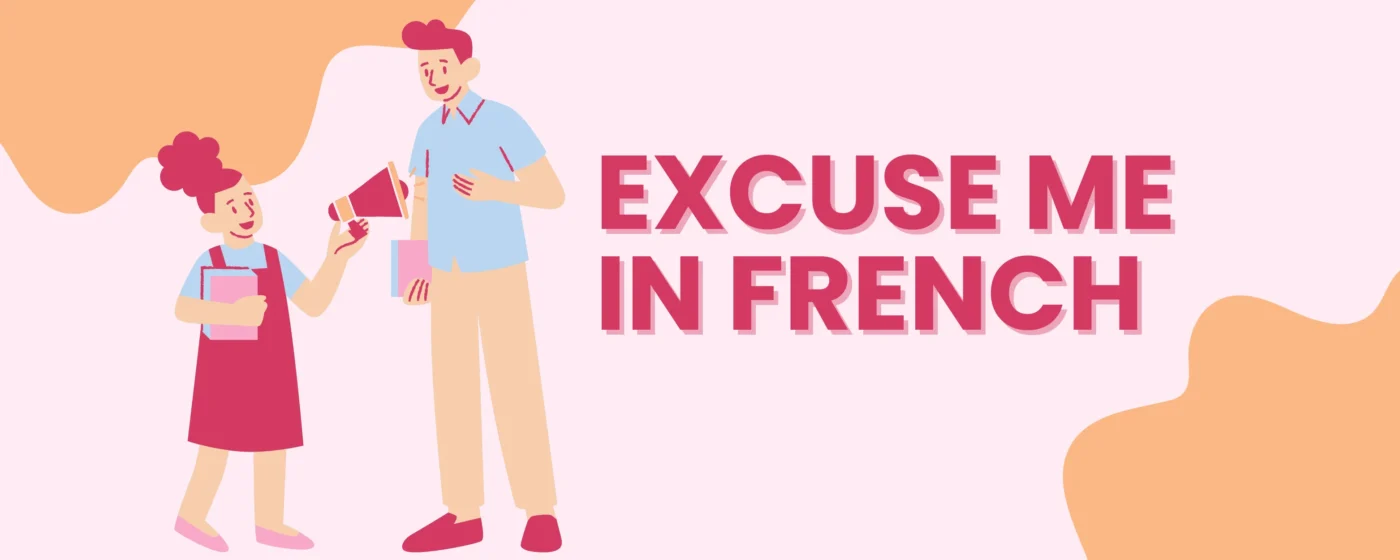In the world of French language, politeness is a must! This stands true not only for thank-you and sorry, but also the often ignored “excuse me”. Knowing different ways to say “excuse me” in French can work wonders for improving your French knowledge repertoire, along with enhancing your communication skills, both in formal and informal settings. So what’re you waiting for? Let’s dive into the world of French politeness by learning 10 different ways to say “excuse me” in French.
Key Takeaways
- Learn the different ways to say “Excuse Me” in the French language, and also know the everyday phrases, Phrases for Asking Someone to move, and more.
- Know the words or sentences for apologising for interruptions like Je suis désolé(e) de vous déranger, Excuse-moi de te déranger, etc.
- Learn the words that help you to gain someone’s attention, such as S’il vous plaît, une minute, Pardon, pouvez-vous m’aider?, etc.
- Teach the phrases for asking someone to move in French and how you can use excuse me words in it, like Permettez-moi, Puis-je passer?, etc.
- Kow te Excusez-moi, which is the top formal all-rounder for apologies, bumping someone, or getting attention politely.
Everyday Phrases to say “Excuse Me” in French
Excusez-moi
Excusez-moi is perhaps the most versatile, common and formal way of saying “Excuse me” in French. It’s often used for apologising for minor inconveniences, like bumping into someone or accidentally walking on someone’s foot, or to politely call for someone’s attention. One thing you must absolutely keep in mind while using this phrase is that it is primarily used to sound format or polite in situations.
Example: Excusez-moi, monsieur, vous avez laissé tomber votre portefeuille. (Excuse me, sir, you dropped your wallet.)
Pardon
Pardon is a common informal way of saying “Excuse me” in French. ‘Pardon’ is also a direct translation of ‘excuse me’ in many situations. It’s the go-to for navigating a big crowd! It’s most apt for using in brief or spontaneous situations. Culturally, it’s used in everyday situations to be polite without sounding too formal! One can say that it’s slightly less formal than “Excusez-moi”.
Example: Pardon, est-ce que cette place est libre? (Excuse me, is this seat free?)
Phrases for Asking Someone to Move
Permettez-moi
Permettez-moi, that translates to “Allow me”, is more formal than “Excusez-moi” or “Pardon”. It’s used in situations where a slightly higher degree of formality is required, or when talking to someone whom you hold high in regard.
This phrase goes beyond simply being polite towards someone. It implies consideration. ‘Permettez-moi’ is often used when you need to address someone respectfully in formal situations. You might hear it in situations where one is offering assistance.
Example: Permettez-moi de vous présenter Monsieur Dubois. (Allow me to introduce you to Mr. Dubois.) Pour en savoir plus sur les pronoms en français, consultez notre guide détaillé.
Puis-je passer?
This is a polite yet somewhat formal phrase to use while navigating crowded spaces. It translates to “May I pass?” and you can use this while commuting in public transport, or to simply respect passage in a busy event situation. It’s appropriate in situations where you wish to show an extra touch of courtesy. However, it can sound a bit rigid in casual situations.
Example: Puis-je passer, s’il vous plaît? (May I pass, please?)
Apologising for Interruptions
Je suis désolé(e) de vous déranger
This phrase translates to “I’m sorry to disturb you”. It’s a formal and considerate French expression used to politely interrupt someone. It’s ideal for usage in professional settings, especially in work environments, such as addressing someone in your office or a person you do not know well. It can also be used in situations where you are seeking help, clearing a doubt or imposing on someone’s time.
Example: Je suis désolé(e) de vous déranger, mais pourriez-vous m’aider? (I’m sorry to disturb you, but could you help me?)
Excuse-moi de te déranger
“Excuse-moi de te déranger” is the informal, perhaps friendly version of “Je suis désolé(e) de vous déranger”, and is often used among friends or in a casual setting, as well as among family members. It’s parfait for daily situations like asking your roommate a quick question or getting a friend’s attention while he’s busy.
Example: Excuse-moi de te déranger, mais tu sais où sont les clés? (Excuse me for bothering you, but do you know where the keys are?) If you’re learning French, be careful of French false friends (faux amis), words that look similar to English but mean something different!
Expressing Regret
Expressing regret in French is an important part of making apologies and showing empathy in various situations. One of the most common phrases is “je suis désolé(e),” which means “I am sorry.” This phrase works well in many situations, such as when you’re late (“je suis désolé(e) pour le retard”) or when you’ve made a mistake.
Another useful phrase is “je regrette,” which means “I regret.” You can use it to express remorse for a specific action, for example: “je regrette de ne pas avoir pu venir” (“I regret not being able to come”). Both phrases allow you to communicate your feelings of regret clearly and sincerely, helping to fix misunderstandings or smooth over awkward moments.
Choosing the right phrase for the situation shows that you understand the nuance of the language and care about the person you’re addressing.
Gaining Someone’s Attention
S’il vous plaît, une minute
This phrase translates to “Please, a minute/ one moment”. ‘S’il vous’ is the beginning of many polite requests in French, such as ‘s’il vous plaît’. It’s a polite way of asking someone for their time or requesting a brief pause. It’s a useful phrase to know for usage in formal situations. It’s a courteous way of requesting some assistance or signalling that you have a question. This phrase can be useful in places like cafes, shops and different types of public spaces.
Example: Excusez-moi, s’il vous plaît, une minute. J’ai une question sur ce produit. (Excuse me, please, one minute. I have a question about this product.)
Pardon, pouvez-vous m’aider?
“Pardon, pouvez-vous m’aider?”, translating to “Excuse me, can you help me?”, is another polite way to ask a stranger for assistance in French. There are alternative ways to ask for help or attention in French, depending on the context. It’s a clear way of asking for help in French, suitable for both formal as well as informal settings. It’s usually put to use when you wish to request assistance without seeming demanding.
Example: Pardon, pouvez-vous m’aider à trouver la poste? (Excuse me, can you help me find the post office?).
Lost for Words? We’ve Got You!
Sign up for our courses and let our expert teachers boost your vocabulary effortlessly!
Polite Expressions
Je m’excuse
“Je m’excuse” translates to “I apologise”. It’s a reflexive phrase and is often used for personal apologies, in informal settings. It’s simply used to express one’s regret for a personal action. This phrase is commonly used when you realise you have done something wrong and want to acknowledge your mistake. This is an accepted cultural way of apologising for minor mishaps that take place in day-to-day life. However, in today’s day and age, it can sound a bit too awkward or overly formal.
Example: Je m’excuse, je suis en retard. (I apologise, I’m late.)
Avec votre permission
“Avec votre permission” translates to “With your permission”. It’s a polite, formal phrase used to seek approval before doing something, in a respectful way. It’s commonly used in official contexts, such as when entering a room, or beginning a speech.
This phrase acknowledges the other person’s authority, especially when the conversation involves elders, superiors! It can also be used when politely requesting permission to leave or to end a conversation, emphasising courteous language in such situations.
Example: Avec votre permission, Monsieur le Président, je voudrais soulever un point important. (With your permission, Mr. President, I would like to raise an important point.)
Mastering French Pronunciation
Getting the pronunciation right is key to making yourself understood and conveying the correct meaning when using French phrases. For example, the phrase “excusez-moi” is pronounced “ex-koo-zay mwah,” while “pardon” is said as “pahr-dohn.” Paying attention to the spelling of each phrase helps you remember the correct pronunciation and avoid confusion with similar-sounding words.
Listening to native speakers whether in person, through language learning apps, or online videos—can help you fine-tune your accent and intonation. Practicing out loud and repeating phrases like “excusez-moi” and “pardon” will build your confidence and ensure you’re using each phrase correctly. Remember, even small differences in pronunciation can change the meaning, so take your time to master each example and make your apologies sound natural.
Cultural Differences
When it comes to apologies in France, understanding cultural differences can make a big impact on how your words are received. French culture places a strong emphasis on politeness and formality, especially when addressing strangers or people in positions of authority.
For example, using “excusez-moi” instead of the more casual “pardon” can convey a greater sense of respect and politeness, particularly in formal situations or when you don’t know the person well. The choice of phrase can change the sense of your apology, so it’s important to be mindful of the context.
Additionally, non-verbal cues like your tone of voice, eye contact, and body language play a role in how your apology is perceived. By paying attention to these cultural nuances and choosing your phrases carefully, you’ll be able to convey your apologies more effectively and build positive relationships in France.
Learning these nuances is just the beginning though. You can dive deeper into mastering French with personalised lessons at La Forêt French Class.
Frequently Asked Questions
1. Can you use “excuse me” with animals?
Ans: It’s not uncommon to say “pardon” in a lighthearted or gentle tone if you accidentally bump into your boss’ pet. It’s more of an expression of affection really, rather than an apology.
2. Are there any completely outdated ways of saying “excuse me”?
Ans: “Je vous prie de m’excuser” (I beg you to excuse me) is rarely used in modern conversations and might sound pompous, instead of implying a polite apology! In everyday situations, a more common phrase like ‘pardon’ is preferred, as it is universally understood and sounds more natural. Try using the other ways listed above to sound more casual and standard in your conversations.
3. What’s the difference between “excusez-moi” and “excusez-moi de…”?
Ans: “Excusez-moi” is a general “excuse me”. However, “Excusez-moi de…” (Excuse me for…) is followed by the reason for the apology or disturbance.
Example: Excusez-moi de vous déranger (Excuse me for disturbing you).
4. What’s the most charming way to say “excuse me” in French?
Ans: Try using “Permettez-moi”, which means “Allow me.” It sounds like a polite gentleman from a classic French film – perfect for impressing someone or adding a bit of flair to your manners. This phrase is considered formal, not familiar, and is best used in polite or formal situations.





